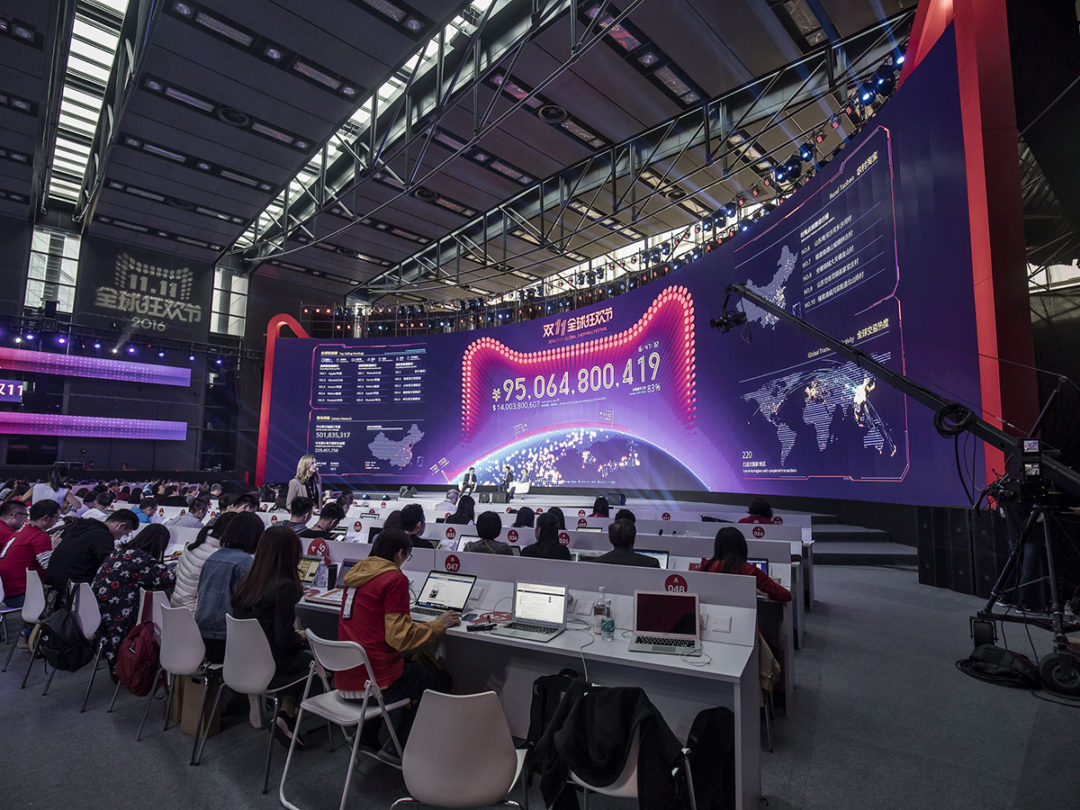
Home » Alibaba Goes International to Hit New Singles' Day Record
Alibaba Goes International to Hit New Singles' Day Record

November 9, 2018
Alibaba Group Holding Ltd. is looking beyond borders to turn its annual Singles’ Day shopping celebration into a global phenomenon.
This Sunday, the Chinese internet giant is including sales from Lazada, the online shopping mall it controls. Southeast Asia’ biggest web retailer is becoming a key part of Alibaba’s plan to fuel growth, on top of the company’s efforts to move into shopping malls, convenience stores and food delivery.
The challenge for billionaire Jack Ma’s online empire is to break another sales transaction record after a decade of exceeding prior results. With a brewing trade war, a cooling economy and rising competition from smaller platforms such as JD.com Inc. and Pinduoduo Inc., Alibaba is seeking to add new growth engines. The retail celebration on Nov. 11 dedicated to the nation’s unattached has become an important bellwether not just for the company, but also the world’s No. 2 economy.
“Singles’ Day has now become a stage for Alibaba to showcase its capabilities across all its platforms,” Daniel Zhang, chief executive officer, said at an October news conference in Beijing. He’s taking over after Ma steps down as executive chairman next year.
It was Zhang who came up with the idea of turning Singles’ Day into a shopfest a decade ago. Now that this year’s one-day bazaar will be Ma’s last as chairman, Zhang will need to prove he can carry on the legacy. “We think 1 billion packages will become a daily event in the future,” he said.
More than half a billion people are projected to visit Alibaba’s websites in search of Dyson hair dryers, infant formula and Gucci bags. Alibaba has been able to post breakneck growth for almost a decade, including a 39 percent jump in sales last year to 168bn yuan ($24.2bn).
Still, there’s some uncertainty this year, due to a slowing economy, real estate deflation and trade tensions with the U.S. that could impact on Chinese consumption. The weaker economy and rising household debt have, to some extent, dampened consumers’ confidence in China.
Online retail sales growth slowed to 24 percent, down 12 percentage points in the second quarter, according to the National Bureau of Statistics. Policy makers have made a slew of changes, including reductions in income tax and tariffs on goods. That indicates spending may pick up in coming months; the earliest proof could come from data during Singles’ Day.
Last week, Alibaba reported quarterly profit and sales well above analysts’ estimates, while trimming its prediction for full-year sales by as much as 6 percent, with Ma warning that the economic conflict between the world’s two largest economies could last 20 years.
To fuel growth, Alibaba is expanding its playbook. Ele.me, the startup it took control of this year, will provide delivery services for select Starbucks stores across 11 cities in China. Rural Taobao will offer coupons for goods across 800 counties, and Lazada will roll out promotions across six Southeast Asian countries including Indonesia, Malaysia and Thailand.
Although it’s been three years since Ma said he wants to make Singles’ Day a global shopping event, that hasn’t happened yet. International expansion will be a key part of Zhang’s plan to keep breaking sales records. Last year, Russia, Hong Kong and the U.S. were the top three regions outside of mainland China to buy goods during the annual event. Popular items purchased overseas included mobile phones, wool coats and knitted sweaters, according to the company.
At the same time, Alibaba’s efforts to push into the U.S. are sputtering. It discarded a pledge to create a million jobs in the country, lost its top U.S. dealmaker and jettisoned plans for affiliate Alipay to acquire MoneyGram. U.S. President Donald Trump said in October that he plans to withdraw from a 192-nation treaty that gives Chinese companies discounted shipping rates for small packages sent to American consumers, making it harder to push into the market.
Southeast Asia will give the clearest indication of Alibaba’s ability to go international. With Singapore-based Lazada now fully under its wing, the region remains one of the company’s relative bright spots.
The slump in China’s advertising sector is also hurting Alibaba. A significant chunk of revenue comes from merchants spending money across the e-commerce giant’s platforms to lure customers. That item, which falls under the category “customer management revenue,” rose 26 percent in the latest quarter, compared with 35 percent in the prior period.
“The macro slowdown has affected advertisers’ sales performances and thus their online ad spending budgets,” Ella Ji, an analyst at China Renaissance, wrote in a report.
RELATED CONTENT
RELATED VIDEOS
KEYWORDS Asia Pacific Business Strategy Alignment China E-Commerce/Omni-Channel Europe Global Logistics Global Supply Chain Management Logistics order fulfillment Retail Transportation & Distribution
Related Directories
Subscribe to our Daily Newsletter!
Timely, incisive articles delivered directly to your inbox.
Popular Stories

2024 Supply Chain Management Resource Guide: There's Only One Way Off a Burning Platform
VIEW THE LATEST ISSUECase Studies
-
Recycled Tagging Fasteners: Small Changes Make a Big Impact
-

Enhancing High-Value Electronics Shipment Security with Tive's Real-Time Tracking
-

Moving Robots Site-to-Site
-
JLL Finds Perfect Warehouse Location, Leading to $15M Grant for Startup
-
Robots Speed Fulfillment to Help Apparel Company Scale for Growth



